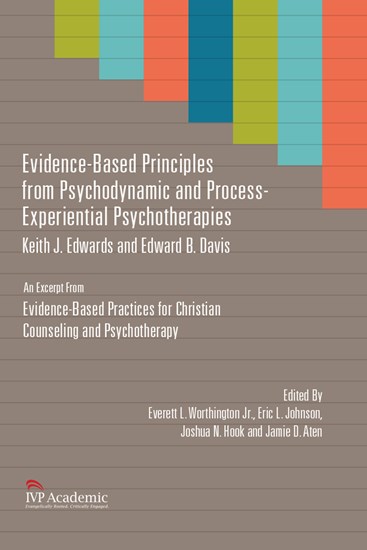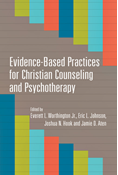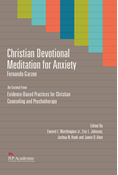
|
Evidence-Based Principles from Psychodynamic and Psychotherapies
ebook
|
- Length: 0 pages
- Published: March 02, 2016
- Imprint: IVP Academic
- Item Code: 8210
- ISBN: 9780830882106
-
Other Retailers:
Amazon*
Christianbook.com*
*affiliate partner
Christians engaged in the fields of psychology, psychotherapy and counseling are living in a unique moment. Over the last couple decades, these fields have grown more and more open to religious belief and religion-accommodative therapies. At the same time, Christian counselors and psychotherapists encounter pressure (for example, from insurance companies) to demonstrate that their accommodative therapies are as beneficial as secular therapies. This raises the need for evidence to support Christian practices and treatments.
This essay by Keith J. Edwards and Edward B. Davis was originally published as chapter 7 in the book Evidence-Based Practices for Christian Counseling and Psychotherapy, edited by Everett L. Worthington Jr., Eric L. Johnson, Joshua N. Hook and Jamie D. Aten.
Edwards and Davis provide an overview of theory and research supporting approaches to psychotherapy that are based in psychodynamic theory and practice, particularly exploring emotion and attachment within relationships with significant adults and with God. Since people develop their sense of self in relationships, those relationships can become the curative focus in psychotherapy. Although no Christian-accomodative RCTs exist at this point, the general approach is strongy supported by secular research. The chapter is particularly strong in practical advice regarding conducting this type of psychotherapy.
Like the other essays in the full-length volume, Edwards's andn Davis's essay contributes to a field of inquiry that, while still in its infancy, promises to have enormous implications for future work in Christian counseling and psychotherapy.
Christian Association for Psychological Studies (CAPS) Books explore how Christianity relates to mental health and behavioral sciences including psychology, counseling, social work, and marriage and family therapy in order to equip Christian clinicians to support the well-being of their clients.
"The publication of this excellent volume marks a developmental step in the maturation of Christian engagement with and reflection on quality provision of counseling and psychotherapy services. The editors and authors represent knowledge of best practices in alleviating human distress in a number of key areas, particularly related to preventing and assisting troubled marriages, and we can hope that the movement they seek to inspire will flourish."
"I love this book for all sorts of reasons. It is edited by some of the most gifted and insightful people I know. The chapters illustrate a variety of treatment approaches as well as diverse ways of gathering evidence to support those treatments. I also appreciate how thoroughly this book reflects wise collaboration between researchers and clinicians, and among early-, mid-, and late-career psychologists. This volume is timely and essential, reflecting both Christian wisdom and prevailing professional standards."
"The concept of evidence-based practice is continually evolving and needs to be applied more systematically to a Christian context. In this volume, top researcher-clinicians come together to provide the state of the art of evidence-based practices for Christian counseling and psychotherapy. It is both broad and deep, and represents a significant advancement in the field of Christian counseling. I highly recommend it for lay counselors, graduate students and seasoned clinicians alike."
"[T]his volume is a major contribution to a field of inquiry that, while still in its infancy, promises to have enormous implications for future work in Christian counseling and psychotherapy."
"This book . . . makes a meaningful contribution to the clinical efforts of those with Christian worldview beliefs and commitments by establishing a foundation of reasonable evidence."
"This book offers a way for clinicians to recognize the importance of using effective treatment and it provides a basis for determining the relative effectiveness of the interventions clinicians select. This book also illustrates several ways Christians can connect to interventions that are compatible with their Christian beliefs and values."
CONTENTS
Introduction
Addressing Problematic Worldview Assumptions
Appropriating Principles from Psychodynamic and Process-Experiential Psychotherapies
Empirical Support for Treatment Efficacy
The Efficacy of Psychodynamic Psychotherapy
The Efficacy of Christian-Accommodated Psychodynamic Treatments
The Efficacy of Process-Experiential Psychotherapy
Shared Assumptions of Psychodynamic and Process-Experiential Psychotherapies
Relationships Are the Crucible of Human Development
Emotions Are the Primary Motivational System
Implicit (Nonconscious) Mental Processes Matter
An Integrative Model of Experiential Therapy
Crucial Process Skills
Phase 1: Accessing and Allowing Emotional Experience
Phase 2: Relational Processing and Making Sense of Emotional Experience
Phase 3: Transformation and Restructuring of Emotional Experience
Summary and Conclusion
Reference




